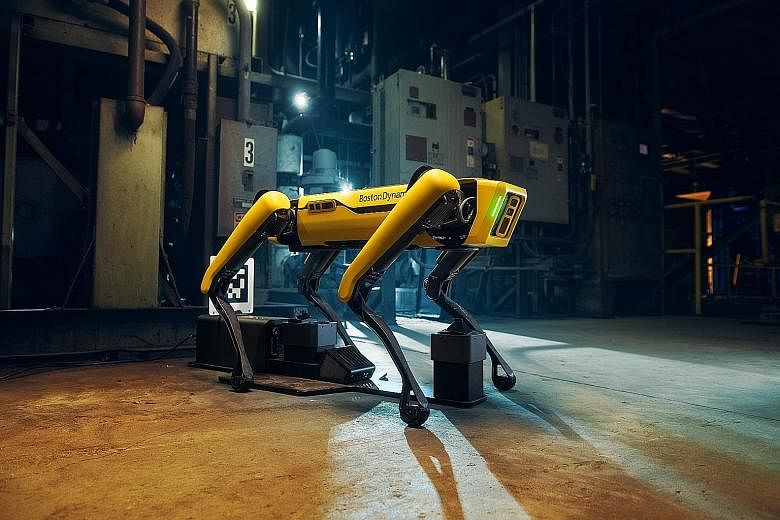NEW YORK • Two men were being held hostage in a Bronx apartment. They had been threatened at gunpoint, tied up and tortured for hours by two other men who pretended to be plumbers to get inside, police said.
One victim managed to escape and called the police, who showed up at the East 227th Street apartment last Tuesday, unsure if the armed men were still inside.
The police decided it was time to deploy Digidog, a 32kg robotic dog with cameras and lights affixed to its frame, and a two-way communication system that allows the officer manoeuvring it remotely to see and hear what is happening. The robot can see in the dark and assess how safe it is for officers to enter an apartment or building where there may be a threat.
In the Bronx incident, police said Digidog helped the officers determine that there was no one inside. Police were still searching for the two men, who stole a mobile phone and US$2,000 (S$2,665) in cash and used a hot iron to burn one of the victims.
"The NYPD has been using robots since the 1970s to save lives in hostage situations & hazmat incidents," the New York Police Department said on Twitter. "This model of robot is being tested to evaluate its capabilities against other models in use by our emergency service unit and bomb squad."
But the robot has sceptics. Representative Alexandria Ocasio-Cortez, a Democrat, described Digidog on Twitter as a "robotic surveillance ground" drone. "Please ask yourself: When was the last time you saw next-generation, world-class technology for education, healthcare, housing, etc consistently prioritised for under-served communities like this?" she tweeted, linking to a New York Post story on Digidog.
American Civil Liberties Union senior policy analyst Jay Stanley said empowering a robot to do police work could have implications for bias, mobile surveillance, hacking and privacy.
A mobile device that can gather intelligence about a volatile situation remotely has tremendous potential to limit injuries and fatalities, said Mr Keith Taylor, a former police sergeant who teaches at John Jay College of Criminal Justice. "It's important to question police authority; however, this appears to be pretty straightforward," he said. "It is designed to help law enforcement get the information they need without having a deadly firefight, for instance."
The Massachusetts State Police and the Honolulu Police Department are also using the robotic dog, which has a 90-minute battery life. The robot has a starting price of about US$74,000, said Mr Michael Perry, vice-president of business development at the maker, Boston Dynamics.
The robotic dog, which bears a resemblance to those featured in the 2017 Metalhead episode of Black Mirror, was not designed to act as a covert tool of mass surveillance, Mr Perry said. "It's noisy and has flashing lights. It's not something that is discreet."
NYTIMES

